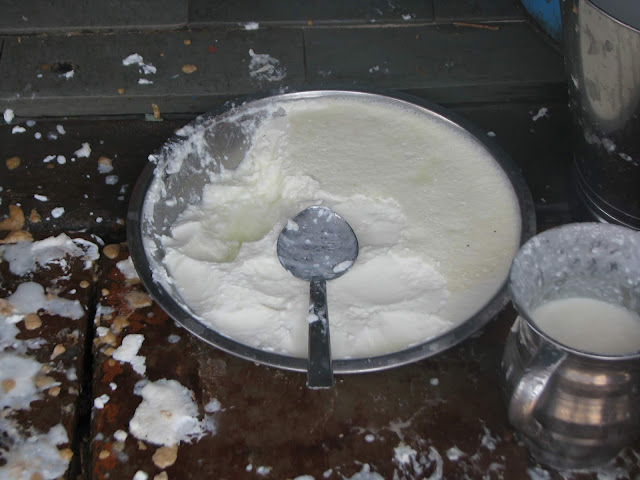Banaras : Lassi
Last week a friend offered us 'packaged' Lassi (when we declined aerated drinks) and my immediate response was - surely we are not having those in Banaras,
People coming to the town are guided by its God places, we have been guided by its Food places, much like birds and mammals our movements are guided by availability of food, though unlike them it is for reasons other than survival,
Lassi is one 'food' which gives immense pleasure and we have often been spotted pedaling around town to partake some during varying times of the day, and seldom has the ratio of people to kullads been 1 : 1,
Like a lot else in life Banarasis take their Lassi seriously, debates on the best places in town to savour Lassi are not uncommon, one often encounters angry- loud responses,
Stories abound of how - during the past - the sellers used to be strict of their Lassi not being wasted and used to - not very politely - tell customers to drink water in the kullad (after the had their Lassi) so that none remained in the kullad,
Once during recent months when we enquired at a Lassi place the uncle got offended that despite staying in town we were unaware to the fact that Lassi in many shops was available only after holi (festival),
Other places have variations - In Shantaram Gregory David Roberts talked of Banana Lassi in Bombay, Aizawl had multiple Lassi shops (the only other item two of them sold was egg roll), during school days we came across stores of Lassi in Punjab being made in machines meant for washing clothes, there will be more,
Within Banaras too one of the shops boasts of a Lassi menu, details I am unsure for the script is Korean, for now I focus on one of the shops we frequent, 'we' stands for different colleagues - friends on separate occasions,
Other places have variations - In Shantaram Gregory David Roberts talked of Banana Lassi in Bombay, Aizawl had multiple Lassi shops (the only other item two of them sold was egg roll), during school days we came across stores of Lassi in Punjab being made in machines meant for washing clothes, there will be more,
Within Banaras too one of the shops boasts of a Lassi menu, details I am unsure for the script is Korean, for now I focus on one of the shops we frequent, 'we' stands for different colleagues - friends on separate occasions,
First - of course - comes the curd, here too people discuss the milk put to use - dairy wale doodh ki hai ya taza doodh ki,
Then some hard work, using machines - I am told - results in less than optimal taste and texture,
The Kullads are then arranged and filled,
This 'revised form of curd' is topped with malai, the tray (of curd) this malai hails from is then put to use for the next 'round' of Lassi ~
Then comes rabdi, many a time this rabdi is warm compared to the 'revised form of curd' and malai, but so far - ever fresh,
Why does one need rabdi and malai in Lassi I have been asked multiple times, my only answer is to taste it, those who taste go into silence before asking for the next kullad, and yes there are no re-fills - one gets a fresh kullad each time,
And one has to pick up one, if you are late you wait for the next 'round', the good part is that the next 'round' comes by the time you feel the place, see others enjoying, take in its smells, colours and retain your place in the vicinity,
Standardisation is not for us, like tea at each stall tastes different and so does Lassi at each shop, and one way to figure out is to enjoy these different tastes, some put rose-water while some have just plain curd (and hard work!), and they all are fun,
There are similar variations in having the Lassi and each of them will touch upon separate senses and have a different feel - single gulp, mixing malai and rabdi, eating the rabdi and malai or else,
Pamela Timms has talked of this with far more eloquence in Korma, Kheer and Kismet : Five seasons in Old Delhi and I will shut up for now,
There are similar variations in having the Lassi and each of them will touch upon separate senses and have a different feel - single gulp, mixing malai and rabdi, eating the rabdi and malai or else,
Pamela Timms has talked of this with far more eloquence in Korma, Kheer and Kismet : Five seasons in Old Delhi and I will shut up for now,
Coming back to the packaged Lassi, the next day took off on cycles for one of our favoured shops,
Having packaged Lassi in Banaras is a little like going to a stadium and watching the event on phone,
Having packaged Lassi in Banaras is a little like going to a stadium and watching the event on phone,






Very nice blog!
ReplyDeleteGlad to visit this blog. Very Informative blog!
We can search for Aesthetic Training Courses in India and review instantly on